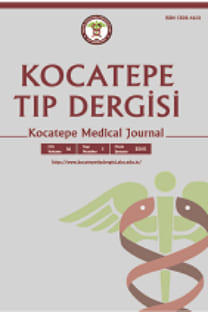Evaluation of DNA damage using comet assay in children on long-term phenobarbital monotherapy for the prevention of recurrent febrile seizures
Komet yönetimi, DNA hasarı, Nöbetler, febril, Fenobarbital, Çocuk
Comet Assay, DNA Damage, Seizures, Febrile, Phenobarbital, Child,
- ISSN: 1302-4612
- Yayın Aralığı: Yılda 4 Sayı
- Başlangıç: 1999
OVERLOOK THE ANDROGEN INSENSITIVITY SYNDROME WiTH A FAMILIAL CASE STUDY
İbrahim Veysel FENKÇİ, Semin FENKÇİ, Rifat EMRAL
Rusen DUNDAROZ, Zelihagiil DEGİM, Halil İbrahim AYDIN, Tuncer Degim\ Faysal GOK, Volkan BALTACI
SiGMOiD KOLON SEROZASINDA ATiPiK LOKALiZASYONLU MYOMA UTERi
Mehmet YİLMAZER, Cemil KAYA, Cem DEMİREL, Nural ERDOGAN, Scvim Dincer CENGİZ
Mehmet YILMAZER, İbrahim Veysel FENKÇİ
Yılmaz DÜNDAR, RECEP ASLAN, Nihal CENGİZ
Diflunisal'in serbest oksijen radikallerine ve karaciğer böbrek histolojisine etkileri
Ayşe Gaye TOMATIR, Ayşe BAŞARAN, Erinç ARAL, Hasan Veysi GÜNEŞ, ERKAN TOMATIR
Yegane Selma TOSUN, Beril ÖZBAKKALOĞLU, Ahmet ŞAHİN
Yılmaz DUNDAR, Rccep ASLAN, Nihal CENGİZ
NiTRiK OKsiT, NiTRiK OKsiT SENTAZ VE SARIMSAK
Ruşen DÜNDARÖZ, ZELİHAGÜL DEĞİM, Halil İbrahim AYDIN, İSMAİL TUNCER DEĞİM, Faysal GÖK, Volkan BALTACI
